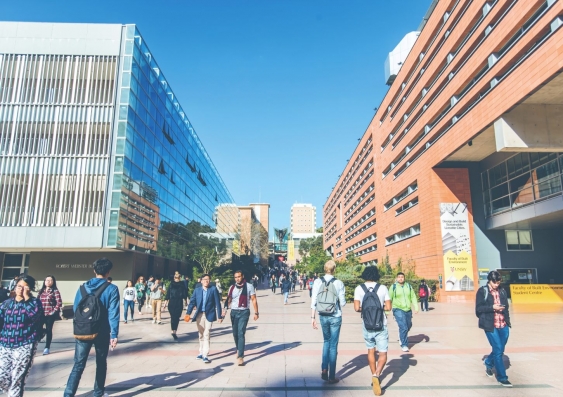UNSW receives more than $17m for 41 ARC Discovery Projects
The new round of grants will support research in science, engineering, medicine, business, arts, and built environment.
The new round of grants will support research in science, engineering, medicine, business, arts, and built environment.

UNSW Sydney academics from the faculties of Science, Engineering, Medicine & Health, UNSW Business School, Arts, Design & Architecture, as well as ∂∂“ű∂Ő ”∆Ķ, have secured funding in the latest Discovery Project round from the Australian Research Council (ARC).
In total, 41 UNSW projects have received more than $17 million, with UNSW Science and UNSW Engineering being awarded the lion’s share. Science has secured 15 grants with funds totalling more than $6 million, while Engineering has 14 projects totalling more than $6 million.
Discovery Projects, a flagship scheme for fundamental research and the largest scheme under the ARC National Competitive Grants Program, provides funding of between $30,000 and $500,000 each year for up to five consecutive years.
Among other things, funding can be used to support research associates or assistants and technicians, access to research and infrastructure facilities, technical workshop services, essential field research, equipment and consumables, and the publication and dissemination of findings.
Professor Jonathan Morris, Acting Deputy Vice-Chancellor, Research & Enterprise, congratulated the University’s researchers on their grant success. 
‚ÄúThe Discovery Projects support cutting-edge research into 'new' knowledge that drives much of Australia‚Äôs world-leading research. The UNSW projects will deliver significant outcomes in fields such as ocean forecasting, advanced manufacturing, health, and architecture. It‚Äôs great to see UNSW researchers perform strongly in this funding scheme once again this year,‚ÄĚ Prof. Morris said.
Among the successful recipients is Professor Moninya Roughan at UNSW Science who has received $693,000 for ‚ÄėUnderstanding multi-scale dynamics of eddies in the East Australian Current‚Äô. This project aims to provide the first rigorous quantification of the dynamics of rotating eddies (the weather systems of the ocean) and fronts on scales ranging from metres to hundreds¬†of kilometres and hours to weeks in the East Australian Current System. This will improve ocean forecasting and the sustainable management of Australian marine industries and the seafood sector.
Associate Professor Jason Scott at UNSW Engineering¬†has received $558,325 for ‚ÄėTandem Photocatalytic Conversion of CO2 to High Value Hydrocarbon Products‚Äô. The project aims to research ways to take carbon dioxide (CO2) (a greenhouse gas that is a driver of climate change) and convert it into other hydrocarbon products that can be useful and have high value, thereby reducing our reliance on fossil fuels. This project aims to develop a conversion process called Tandem Photocatalytic Conversion.
Professor Simone Pettigrew at The George Institute for Public Health and UNSW Medicine & Health¬†has been awarded $515,000 for ‚ÄėCommunity Self-determination in the Era of Automated Home Delivery Systems‚Äô. Cities are on the cusp of major disruption due to the impending growth of home delivery services using autonomous vehicles such as trucks, shuttles, bots, and drones. The aim of this project is to protect communities in a future characterised by the widespread use of automated product deliveries. The project will deliver modelled scenarios and negotiated policy recommendations that reflect community consultation.
Associate Professor Elvira Sojli at the UNSW Business School¬†has been awarded $324,861 for ‚ÄėEffects of offshored advanced manufacturing on productivity, and growth‚Äô. Offshoring can reduce production costs, but it can also reduce cutting-edge advanced manufacturing capability, a skilled manufacturing workforce and reduce future growth. The project expects to generate new knowledge on the impact of offshored advanced manufacturing on productivity, growth, product innovation, and skilled labour.
Dr JuHyun Lee at UNSW Arts, Design & Architecture¬†has received $310,421 for ‚ÄėArchitectural Design Across Spaces and Cultures: Technology and Language‚Äô. This project addresses two significant barriers facing Australia‚Äôs architectural practices; designing in spatially distributed and culturally diverse teams. The research seeks to develop new knowledge about the cognitive, social and technical factors that shape the effectiveness of online international design teamwork.
Dr Neil Ramsey at ∂∂“ű∂Ő ”∆Ķ has received $185,844 for ‚ÄėRomanticism and the Poetics of First World War Literature‚Äô. This project asks how the poetics of 19th-century Romanticism informed the literature of the First World War. The project will help inform understanding of the cultural memory of war in Australia, which is of critical importance as the nation undertakes its largest peace-time expansion of the Australian Defence Force and redevelops the Australia War Memorial.
Find more of UNSW’s successful grants.